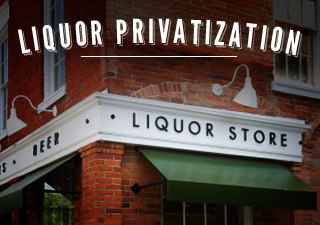Media
Understanding the Support for Liquor Store Privatization
 On Valentine’s Day, the Senate Law and Justice Committee heard testimonies on liquor store privatization, including comments from CF’s Nathan Benefield and Duquesne University professor Antony Davies. During the committee hearing, Minority Chairman Ferlo made this statement, referring to the state’s wine and spirit stores:
On Valentine’s Day, the Senate Law and Justice Committee heard testimonies on liquor store privatization, including comments from CF’s Nathan Benefield and Duquesne University professor Antony Davies. During the committee hearing, Minority Chairman Ferlo made this statement, referring to the state’s wine and spirit stores:
The system’s not broke. What is all this craziness? We’re involved in a crisis in this state with so many other critical issues and the biggest issue right now we’re arguing about is the state store system. It’s nonsensical to me, I don’t get it.
But, the state’s system is broken. Only two states, Utah and Pennsylvania (New Hampshire is typically excluded from the “full control” classification because of its relaxed wine and spirit laws), still have a government monopoly on the sale of wine and liquor at the retail and wholesale level. The Pennsylvania Liquor Control Board (PLCB), which runs all the state liquor stores, is inefficient and expensive and the people of Pennsylvania know it. Here are some facts:
PLCB forces Pennsylvanians to pay more and limits their selection.
- The PLCB adds a 30 percent markup on all products.
- Pennsylvanians pay up to 50 percent more for liquor than in other states—many of which create customer loyalty programs.
- Other states offer a variety of wines and liquors not available in the Commonwealth.
- The PLCB is in the process of cutting 400 wine and spirit products.
- In many other states you can buy wine online and have it delivered to your door.
State stores are turning Pennsylvanians into bootleggers.
- Anyone can witness the liquor stores set up right across the borders in New Jersey, Delaware, Ohio and other states, catering to Pennsylvanians, however it is illegal for Pennsylvania to purchase alcohol bring it back across state lines.
- If PA has better prices and superior stores, why would people cross borders? Alcohol is a legal substance, and it is time to stop criminalizing it and turning Pennsylvanians into bootleggers.
It provides greater cost, with no great protection.
- A study by Dr. Antony Davies of Duquesne University found the level of state control on alcohol has absolutely no link to underage drinking, binge drinking and DUI fatalities.
- This is the only study of its kind on the topic, looking not at only one state but 41 states over 21 years, and using the most sophisticated analytic techniques.
- Additionally, a comprehensive literature review by Dr. Davies looks at peer reviewed studies of liquor privatization and degrees of control. Overall, there is no clear evidence that privatization of alcohol markets leads to negative social behaviors.
Finally, we’re discussing liquor store privatization because Pennsylvanians want it privatized—a Quinnipiac poll released yesterday shows 65 percent of voters (including more than 60 percent of Republicans, Democrats, and Independents) would support liquor store privatization. Now is the perfect time to get the government out of the booze business.